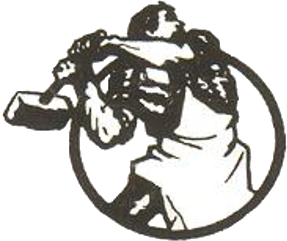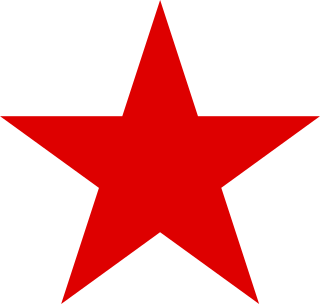
Leninism is the political theory for the organisation of a revolutionary vanguard party and the achievement of a dictatorship of the proletariat as political prelude to the establishment of socialism. Developed by and named for the Russian revolutionary Vladimir Lenin, Leninism comprises socialist political and economic theories, developed from Marxism and Lenin's interpretations of Marxist theories, for practical application to the socio-political conditions of the Russian Empire of the early 20th century.
Trotskyism is the theory of Marxism as advocated by the Russian revolutionary Leon Trotsky. Trotsky identified as an orthodox Marxist and Bolshevik–Leninist. He supported founding a vanguard party of the proletariat, proletarian internationalism and a dictatorship of the proletariat based on working class self-emancipation and mass democracy. Trotskyists are critical of Stalinism as they oppose Joseph Stalin's theory of socialism in one country in favor of Trotsky's theory of permanent revolution. Trotskyists also criticize the bureaucracy that developed in the Soviet Union under Stalin.

The Communist Workers' Party of Germany was an anti-parliamentarian and left communist party that was active in Germany during the time of the Weimar Republic. It was founded in April 1920 in Heidelberg as a split from the Communist Party of Germany (KPD). Originally the party remained a "sympathising member of Communist International." In 1922 the KAPD split into two factions, both of whom kept the name but are referred to as the KAPD Essen Faction and the KAPD Berlin Faction.

The International Communist Party (ICP) is a left communist international political party which is often described by outside observers as Bordigist due to the contributions by longtime member Amadeo Bordiga. The strongest base of the ICP remains Italy, where it was founded, but the party also has sections in other countries.

In political and social sciences, communism is the philosophical, social, political, and economic ideology and movement whose ultimate goal is the establishment of the communist society, which is a socioeconomic order structured upon the common ownership of the means of production and the absence of social classes, money, and the state.

The Marxist–Leninist Communist Organization – Proletarian Way is a French Maoist organization formed in 1976, whose political practice is Marxist, Leninist and Maoist.
Shramik Sangram Committee is a leftwing organisation in West Bengal, India. SSC publishes Shramik Istehar.
The Fourth International (FI), founded in 1938, is a Trotskyist international. In 1963, following a ten-year schism, the majorities of the two public factions of the Fourth International, the International Secretariat and the International Committee, reunited, electing a United Secretariat of the Fourth International. In 2003, the United Secretariat was replaced by an Executive Bureau and an International Committee, although some other Trotskyists still refer to the organisation as the USFI or USec.

Internationalism is a political principle which transcends nationalism and advocates a greater political or economic cooperation among nations and people.

Left communism, or the communist left, is a position held by the left-wing of communism which criticises the political ideas and practices espoused by Marxist–Leninists and social democrats. Left communists assert positions which they regard as more authentically Marxist than the views of Marxism–Leninism espoused by the Communist International after its Bolshevization by Joseph Stalin and during its second congress.

In Marxist philosophy, the dictatorship of the proletariat is a state of affairs in which the working class hold political power. Proletarian dictatorship is the intermediate stage between a capitalist economy and a communist economy, whereby the government nationalises ownership of the means of production from private to collective ownership. The socialist revolutionary Joseph Weydemeyer coined the term "dictatorship of the proletariat", which Karl Marx and Friedrich Engels adopted to their philosophy and economics. The Paris Commune (1871), which controlled the capital city for two months, before being suppressed, was an example of the dictatorship of the proletariat. In Marxist philosophy, the term "Dictatorship of the bourgeoisie" is the antonym to "dictatorship of the proletariat".

Maoism , often stylized as Maoism–Third Worldism or simply MTW and not to be confused with Third Worldism generally, is a broad tendency which is mainly concerned with the infusion and synthesis of Marxism—particularly of the Marxist–Leninist–Maoist persuasion—with concepts of non-Marxist Third Worldism, namely dependency theory and world-systems theory.
Marxism–Leninism–Maoism is a political philosophy that builds upon Marxism–Leninism and Mao Zedong Thought which was first formalised in 1988 by the Communist Party of Peru.

Proletarian internationalism, sometimes referred to as international socialism, is the perception of all communist revolutions as being part of a single global class struggle rather than separate localized events. It is based on the theory that capitalism is a world-system and therefore the working classes of all nations must act in concert if they are to replace it with communism. Proponents of proletarian internationalism often argued that the objectives of a given revolution should be global rather than local in scope—for example, triggering or perpetuating revolutions elsewhere.

Permanent revolution is a term within Marxist theory coined by Karl Marx and Friedrich Engels by at least 1850, but which has since become most closely associated with Leon Trotsky. Furthermore, the uses of the term by different theorists are not identical. For instance, Marx used it to describe the strategy of a revolutionary class to continue to pursue its class interests independently and without compromise despite overtures for political alliances and the political dominance of opposing sections of society. Trotsky extrapolated this to his conception of permanent revolution as an explanation of how socialist revolutions could occur in societies that had not achieved advanced capitalism. Trotsky's theory also argues: (1) that the bourgeoisie in late-developing capitalist countries are incapable of developing the productive forces in such a manner as to achieve the sort of advanced capitalism which will fully develop an industrial proletariat; and (2) that the proletariat can and must therefore seize social, economic and political power, leading an alliance with the peasantry.
Arrigo Cervetto was an Italian communist revolutionary and politician. He was the cofounder of the newspaper Lotta Comunista, along with Lorenzo Parodi.












